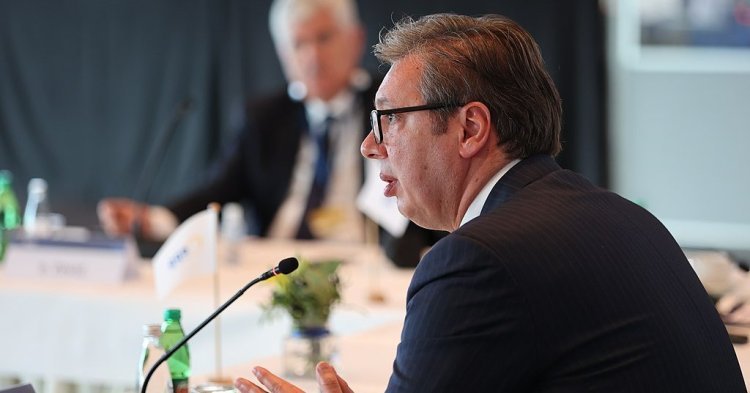This text is written and published as part of the Democracy Under Pressure Campaign of JEF Europe
For the 19th consecutive year, JEF Europe renewed its commitment to a fairer and more democratic global order through its initiative "Democracy Under Pressure," which aims to analyse the obstacles confronting democracy. As democracy faces various threats, the crackdown on the freedom of the media remains one of the most prevalent and challenging to evaluate accurately, while maintaining its disruptive potential. This is the case in Serbia, which carries an unfortunate history of oppression towards activists, journalists and media outlets, and an increasing lack of transparency as well as corruption of media, and of the wider media market in general.
The establishment of democracy in Serbia reflects a tumultuous journey marked by periods of authoritarian rule, resistance, and democratic transition, with ongoing efforts to build and consolidate democratic institutions and values.The democratic movement took root in the late 1990s and early 2000s, following nearly a century of political turbulence. This era began with the Kingdom of Yugoslavia, into which Serbia was integrated after World War I. Subsequently, after World War II in 1945, the Socialist Federal Republic of Yugoslavia emerged, established amidst the resistance spearheaded by the Communist Party under the leadership of Josip Broz Tito. With the fall of communism in Eastern Europe and the dissolution of the Socialist Federal Republic of Yugoslavia, which officially occurred in 1992, Serbia observed the rise to power of Slobodan Milošević, and the reintroduction of an authoritarian and nationalist regime, characterized by the continuous oppression of political opposition and the freedom of media. The renewal of an oppressive regime served as fuel for the democratic movement, which succeeded in overthrowing Milošević in 2000, through the Bulldozer Revolution, laying the groundwork for Serbia to be reintegrated into the international community, and initiating a democratic reform. Since this point, Serbia has made continuous efforts towards democratization and the preservation of human rights, pursuing European integration. Unfortunately, the ruling Serbian Progressive Party (SNS) led by Aleksandar Vučić, has strongly eroded many of the steps taken, putting pressure on independent media, political opposition, and civil society organisations, restoring the threat to the institution of a successful democracy in Serbia.
Since the rise to power of Vučić in 2012, the Serbian government began a censorship campaign, with a media empire built on several state-controlled media outlets, which benefits from the lack of a media watchdog or anti-corruption agencies, and a weak parliament. The report published by Reporters Without Frontiers brings light to a fractured media landscape, with over 2,500 media outlets registered, spacing from state-controlled broadcasters, such as RTS, considered to be the largest and most influential broadcaster, and very limited number of independent outlets, such as the independent network N1, defined by Pauline Adès- Mével, representative of Reporters Without Frontiers, as “the only big independent television station in Serbia”. Over the years, independent outlets have often been subject to pressure, harassment, and death threats, as these channels are catalogued as "anti-Serbs" and "traitors" by ruling party MPs. The media landscape has also recently welcomed RT Balka, a Serbian-language offshoot of the Russian propaganda TV channel RT, which was introduced as a response to the ban issued by the European Union as part of sanctions packages that were imposed in reaction to Russia’s invasion of Ukraine. In this regard, a threat to democracy is recognized in the anti-EU narratives propagated by numerous media outlets and in the interference of foreign outlets, especially when it comes to Russia’s war of aggression against Ukraine.
During the negotiations for Serbia's accession to the European Union, there have been many assessments of the state of freedom and transparency of the media. In 2023, Serbia showed some kind of preparation on the theme, as well as limited progress, including the incorporation of amendments aimed at enhancing the independence of the regulatory body for electronic media (REM) and streamlining the process of public co-funding, making it more transparent and accessible. Despite this, the trend is not positive, and the state of media coverage did not align with European standards. The reform of the Regulatory Body for Electronic Media (REM) is threatened by the Law on Public Information and Media and the Law on Electronic Media, developed by the Ministry of Information and Telecommunications, which may result in a return to full state ownership of private media. Moreover, threats, intimidation and violence against journalists remain a strong concern, as well as the increase of Strategic Lawsuits against Public Participation (SLAPP) by members of national and local authorities, which may be used to dissuade criticism, investigative reporting or activism, and cause self-censorship. Particular concern is also reserved for the lack of transparency in the delivery of information during the elections, which consistently undermined the integrity of the electoral process, generating a further threat to democracy. With concern to the parliamentary election held in Serbia in December 2023, the European Parliament has made several allegations against the government’s management of media outlets, raising concerns over the favouring of state-owned enterprises in the deliberations, disfavouring media pluralism, failing to take legal action or sanction unlawful manipulation of the Voter Registry and voting rights, indirect encouragement of disinformation and unethical media reports, intimidation against citizens and election candidates, corruption, and improper use of citizens' data.
Overall, the future is not so bright. As Serbia continuously renews its interest and commitment to conform to European standards and has made small steps under Vučić's leadership, the lack of transparency of media outlets and the system of corruption still raise concerns and continue to represent a threat to the establishment of a successful democracy. Until media pluralism and freedom of expression are not guaranteed, in favour of state-controlled or politically conformed media outlets, the possibility of building a vibrant democratic society remains a path full of obstacles, and the possibility of overcoming these challenges remains a mystery, and yet, a hope.

Follow the comments: |
|
